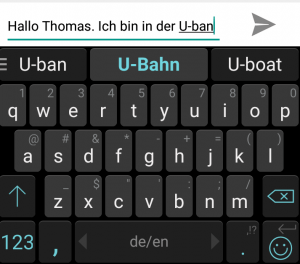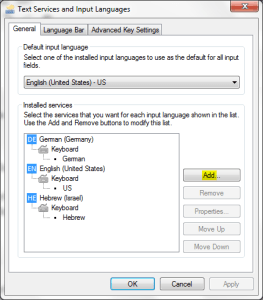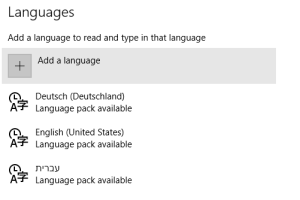André Klein's Blog, page 11
April 15, 2016
10 Online Games To Boost Your German Learning (Text, Strategy, Adventures)

Online games can be a fun way to learn German, but the problem is that most games designed specifically for learners are utterly boring, so learners will often be better off to just play games designed for native German speakers. I’ve already written about how to use classic adventure games or your Steam library for learning German by gaming. Today, I’d like to show you a few games you can play directly in your browser, no downloads needed.
Text-Adventures: Online Games As Interactive StoriesOne of the best ways to learn German through online games is with a good text-adventure. Don’t know what I’m talking about? A text-adventure is basically an interactive story where you get to decide over what happens next, like a choose your own adventure book, only digital. A benefit of reading/playing in your browser is that you can easily use tools like lingua.ly to translate and save words for further study.
But where to get text-adventures in German? Here are a few suggestions:

img via ifwizz.de
“Abgesang: Der Tag der Toten”, by L.C. Frey is an interactive horror adventure story and it starts like many text-adventures, in a small, dark room. You wake up and your head is spinning …
Another story by the same author “Düstere Dickichte 1: Schurken-Alarm!” is more of a fantasy-adventure story. You’re a mercenary working for the emperor’s army to get rid of a bandit’s nest. Do you have what it takes?
If you’re looking for an interactive story written specifically with German learners in mind, I’d also like to point you to my own project “Aschkalon”, a medieval fantasy adventure spanning over three episodes. You can get the books as paperback editions, in Kindle format or just read them in your browser, for free.
Still can’t get enough of German text-adventures? Head on over to ifwizz.de, a huge database for these types of interactive stories in many languages, including German.
Point & Click Adventures in GermanAnother great genre for learning languages is the classic point & click adventure. I’ve written a more detailed article about this here, but today I’d like to focus specifically on point & click adventures that you can play in your browser.
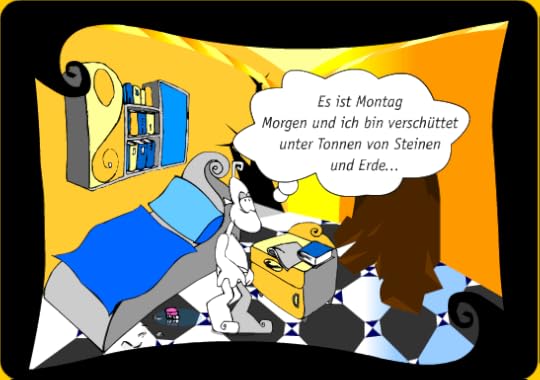
“Leos großer Tag” is a charming little adventure about a strange creature waking up to a landslide on a Monday morning. The game is flash-based, so it won’t work on most mobile devices, but if you’re on a desktop computer you should definitely give it a try.

“Deponia”, by the German studio Daedalic Entertainment has become somewhat of a household name among point & click fans recently. There’s a lot to say about the story, but if you like wacky humor and weird puzzles you’ll love Deponia. You can play a demo of the first episode on their Facebook page (flash-based).
Language Learning Games Don’t Have to Be BoringRemember when I said that most didactic Games are boring? Well, the Goethe-Institut has been making a lot of efforts to change that, and while their games may still not be as exciting as “real” games, at least they offer something else than the same old cross-word puzzles and quizzes of other educational sites.
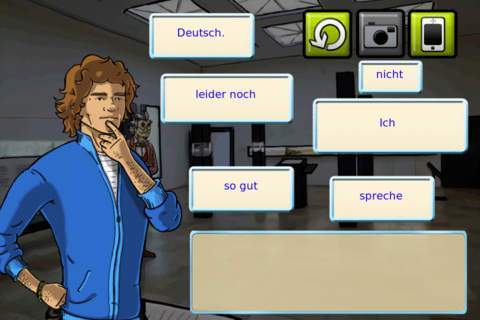
In “Das Geheimnis der Himmelsscheibe“, an adventure and puzzle game developed by Reality Twist for the Goethe Institut, you play an art expert, trying to unravel the mysteries of the 40,000 year old Nebra sky disk. By engaging in dialogues with other characters and solving (didactic) puzzles, German learners (around A2) will be able to apply and improve their German skills.

In another game by the Goethe institut titled “Erfindergeist” you can learn about German inventors and help them make decisions while they send you text messages. Since the game is not flash-based you can select and copy unknown vocabulary for translation or further study. An English version of this game is also available, so you can check your comprehension.
Free To Play Online Strategy Games in GermanFirst of all, I’m not a big fan of the Free to Play (F2P) model where a game itself is free but players are encouraged every few steps to buy upgrades, timers and virtual currency with real currency, although more and more games and genres are adopting this way of handling things.
But when it comes to quality online strategy games nowadays, it’s either F2P or more nerdy text-based management games (check out this site if that’s your cup of tea). So I’ve decided to mention two F2P strategy and planning games here which actually seem like fun and not just quick cash grabs on the developer’s side.

“Die Siedler” is a famous game series about building and managing your own settlements and economy by German game developer studio “Blue Byte”. With “Die Siedler Online”, you can now build, expand and micro-manage your settlement in your browser and learn a lot of related vocabulary along the way.
As with all F2P games, the game is free, but you can purchase upgrades and virtual currencies. If you just want to dabble a bit in settlement building and marvel at words like “Nadelholzfällerhütte” however, this won’t be necessary.
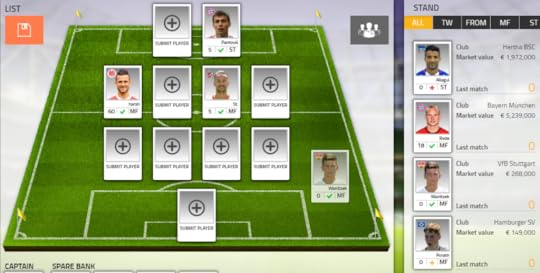
Have you ever dreamed of managing your own German football club and join the national league? Well, with “Bundesliga Manager“ you can do it from the comfort of your chair. Found your own club, fine-tune your lineup and rise in the league. Obviously, this game features a lot of highly specific football-related vocabulary, so not everyone will be interested in this. But a big bonus is that all text on screen can be translated with Google Translate or other language-related browser extensions.
Also here there is an option of buying virtual currency to accelerate and simplify certain aspects of the game, but if you just want to casually play and learn a bit of German, it won’t get in your way.
Casual Games in GermanOf course there are many other browser-games you could play, but it’s not always easy to find games in German, because most websites dedicated to browser games don’t let you filter by language. Having said that, I’d like to recommend one more casual game, which is in German and just too charming to pass up.

“Schafes Heim, Glück allein“, is a puzzle game, where you have to navigate obstacle courses by using three different sheep with different properties. It’s quite fun actually and the art style and sound is very well done.
–
The post 10 Online Games To Boost Your German Learning (Text, Strategy, Adventures) appeared first on LearnOutLive.
April 8, 2016
Learn German On Reddit With These 22 German Subreddits

Reddit, aka “the front page of the internet” is one of the biggest social networks and entertainment websites in the world. Reddit is a lot of things, both good and bad, but the way it works is that users submit links, images or text and then its 234 million users vote on these submissions, making them climb up to the front page or vanish in the archives.
There are thousands of different “subreddits” which are like forums for special topics for anything from avocados to zombies. Much of Reddit’s content is in English, but there are also quite a few German subreddits. In the following article you can find a small selection.
/r/de – The German Reddit Hub/r/de is the central subreddit for everything German on Reddit. It’s basically a German version of Reddit, so the content here is very diverse. On /r/de you can find discussions about German news, politics, strange and funny pictures, all in German. It’s mostly used by natives, but there are also many learners here, so don’t be afraid to join the fray!
Subreddits For German Learners

On this subreddit specifically dedicated to German learners you can find discussions about vocabulary, grammar and links to helpful resources. Feel free to post your own questions!
If you’re looking for simple German videos with subtitles (either English or German) or just videos that feature slowly spoken German, this is a good place to start your journey.
German Humor SubredditsJust to get things out of the way, Germans do have a sense of humor, but do you have the German skills necessary to grasp it? Having said that, Reddit can be a great place to find jokes, (un)funny memes and puns.
Here you can find short written jokes in German. So if you’re looking for some short reading practice, /r/witze can be a fun place to do some quick comprehension training.
If you’re looking for even shorter jokes condensed into one or two words, have a visit over at /r/germanpuns. Some of them are quite silly, but that’s the whole point of this subreddit.

via /r/germanpuns
This is basically a German version of /r/MURICA, in short, a place where German culture and self-image is celebrated and made fun of at the same time. Some posts may be a bit stereotypical (yes, Germans love Fußball and Bier) but you can definitely glean some insights into cultural and national identity here.
This place is similar to the English /r/nottheonion where news are reported that sound so silly that they could only be the invention of a satirical news outlet, but (un)fortunately they’re real.
Subreddits for German MusicBrowsing Spotify can be a great way to find new German music, but sometimes it’s nice to get recommendations from real people. So put on your headphones, turn up your stereo and head to:
/r/germusic
/r/germanrap
/r/de_punk
Once you found a song you like, pop on back to Spotify, turn on the lyrics and try singing along. Or, if you don’t want to be lynched by room mates or family members for singing off key, just translate the song line by line, silently.
German TV, Movies, Audiobooks and Podcasts“Dokumentation” (short: “Doku”) is the German word for documentary. So if you’re looking to learn about faraway lands, cultures, science, pseudo-science and conspiracy theories in German, this is the place to go.
Are you a movie nerd or just like to stay up to date on international releases and chit-chatter about actors and directors? On /r/filme you can do all of this, and call it German practice.
Want to learn more about current and upcoming German TV series or just see how Germans talk about American shows? /r/fernsehen is your friend.
Listening to audio books can be a pleasant way for more advanced readers to literally keep the language in your ear while you go about your day. On /r/hoerbuecher you can listen to excerpts (and sometimes full versions) of both classics and contemporary literature.
Talking about listening, there are actually a great number of German podcasts out there, so why not visit this subreddit and add a few more feeds to your list?
Even More German SubredditsAll of the above German subreddits are just the tip of the iceberg. To find more, go to /r/de and check out the sidebar on the right. Sport fans for example might want to check out /r/bundesliga or /r/bfd. Then there’s the German subreddit for gaming and gamers /r/zocken. Also, most major cities have their own subreddits, e.g. /r/berlin and /r/hamburg (complete listing here). And then there are also specific subreddits for Austria (/r/austria) and Switzerland (/r/switzerland). In short, there’s a lot to discover. Feel free to add your own personal favorites of German subreddits in the comments below.
–
The post Learn German On Reddit With These 22 German Subreddits appeared first on LearnOutLive.
March 31, 2016
How To Do A German Accent In 4 Simple Steps And Become the Next Supervillain
Do you sometimes wish you didn’t have a foreign accent while speaking German? Perhaps then for once German natives would stop switching to English and finally honor your painstakingly constructed utterances! Well, it takes time to develop a good command of a foreign language, especially when it comes to accent-free speaking. The muscles in our throat, tongue and jaws are hard-wired to the set of sounds belonging to our mother tongue, and learning a new language often means breaking with ingrained habits.
This is why sometimes it can be helpful to take an indirect approach. So today, let’s learn a few key points about how to speak with a German accent, to help fine-tune your ears for the peculiarities of German phonetics and just have some fun!
1. “Say vot?” – Instead of “W” and “WH”, just say “V”
Udo Kier as Dragonetti in Blade (1998), via planetpulp.dk
When a German speaker wants to say: “Where is my wife’s jewelry?”, it will often sound like this: “Vere is my vife’s jevelry?’. That’s because in German, there is no “W” sound like in the English “war”, or “white”. It all sounds like “V” in “vase” or “Vienna”. Vice versa, when you see a German sentence like: “Wo sind die Bratwürste?”, simply make those German “W”s sound like English “V”s, so what you’ll actually say will sound more like: “Vo sind die Bratvürste?”
2. “Somesing to sink about!” – Flatten “TH” to “Z” or “S”
Christoph Waltz as Dr. King Schultz in Django Unchained (2012). Not really a villian, but valid because Waltz. (via)
Next up, let’s take a look at the most dreaded sound for German natives, the English “TH”, also known as voiced or voiceless dental fricative. This sound doesn’t exist in German, so struggling with positioning the tongue at the back of the upper teeth, most native Germans will just blurt out something that sounds like “Z” in “zoo”, or “S” in “sea”. Therefore, a sentence like: “This is something I’ve been thinking about.”, after applying our German accent, will sound like this: “Ziss iss somesing I’ve been sinking about.”
3. Let’s get Fricative! – Gargle Every “R” In Your Throat
Klaus Maria Brandauer as Maximillian Largo in Never Say Never (1983)
And since we’re talking about sounds that don’t exist in German, let’s take a look at the English “R” as in “rude” or “river”. When speaking with a German accent, never make that sound! Ever. Instead — and this is a bit tricky, because this replacement sound doesn’t exist in English — pronounce all “R”s as what linguists call voiced uvular fricatives. To produce it, try gargling without water until there’s a soft vibration in the throat. The German “R” in “Ratte” or “fragen” sounds like this:
https://upload.wikimedia.org/wikipedia/commons/a/af/Voiced_uvular_fricative.ogg
audio via Wikipedia / Creative Commons
As an alternative to the voiced uvular fricative, sometimes German also uses a uvular trill, but except for poetry readings and some local dialects it’s slowly fading out of fashion. It sounds like this:
https://upload.wikimedia.org/wikipedia/commons/c/cb/Uvular_trill.ogg
audio via Wikipedia / Creative Commons
4. “Ze kitts heff many frents.” – Harden your consonants
Peter Sellers in Dr. Strangelove (1964), via phactual.com
Another interesting phenomenon in German is called “Auslautverhärtung”, meaning whenever presented with a “soft” consonant at the end of a word, such as “g, d, b”, we pronounce them like their “harder” brothers “k, t, p”. So let’s take a look at a sentence like: “I hurt my head in the pub.” After putting it through a German accent, it will sound like this: “I hurt my hett in the pup.” Needless to say, this makes for a lot of funny misunderstandings, because in English, the meaning of some words changes when doing this, i.e. pub/pup, kid/kit, rib/rip.
The same thing happens with the “S” sound, by the way. Whenever you hear someone do a bad German accent on TV or in the movies, they will just hiss all their “S”s all over the place, but it actually just happens at the end of words! So, whenever you see the letter “S” in a German word like “sitzen” or “reisen” it’s not hissed, but pronounced like the English “Z” in “breeze”. But when it appears at the end, like in “Bus” or “Reis”, it sounds like the regular English “S” in “sorrow” or “fuss”.
These are just a few key points, but by following these couple of rules, you got the basic features of an authentic German accent, whether for your next audition as a stereotypical Teutonic scientist or just to amuse friends and family.
–
The post How To Do A German Accent In 4 Simple Steps And Become the Next Supervillain appeared first on LearnOutLive.
March 23, 2016
How To Use A German Keyboard On Your iPhone, Android, Mac or Windows PC

photo by Christian Schnettelker via FlickR (CC)
Have you ever struggled with German spelling? Don’t worry, we all have, even for native Germans the many rules and reforms can quickly turn correct spelling into a guessing game. But as with everything, practice makes perfect, or as we say in German: “Übung macht den Meister.“
And it’s never really too early to start! This is why, in the following article I’ve outlined some ways in which you can enable a German keyboard on your Android, iPhone, Mac or Windows PC so you can start writing in German today (and get some spelling help along the way).
How To Use a German Keyboard on Your iPhone or iPad On your iDevice, go to Settings > General > Keyboard > Keyboards.Select “Add New Keyboard”Select “German”Now, whenever you’re writing something, whether in an instant message, or in your browser, you can use the globe icon to switch your installed keyboards.
On your iDevice, go to Settings > General > Keyboard > Keyboards.Select “Add New Keyboard”Select “German”Now, whenever you’re writing something, whether in an instant message, or in your browser, you can use the globe icon to switch your installed keyboards.Also, you’ll receive spelling help along the way. You’ll now see wrongly spelled (or unknown) words underlined in red, and iOS will also suggest correct spelling in a bubble popup.
Use a German Keyboard on your Android Device Also on Android, you can easily add and switch between custom keyboards. The exact instructions for changing your keyboard may vary depending on the device and Android version, but the process is generally very similar. Here’s how to do it on “stock” Android, Lollipop:
Also on Android, you can easily add and switch between custom keyboards. The exact instructions for changing your keyboard may vary depending on the device and Android version, but the process is generally very similar. Here’s how to do it on “stock” Android, Lollipop:
The standard Google keyboard app is not bad. It will help you with spelling and suggest words as you type. Alternatively, you can also install a custom keyboard app such as SwiftKey to help with prediction and spelling. One thing I personally like about SwiftKey is that you can use German and English keyboards simultaneously, without having to manually switch between them (see example below).
How to Type German Letters on Windows 7 & 10 On Windows 7:
On Windows 7:
 On Windows 10:
On Windows 10:
 Click the Apple menu and go to “System Preferences”Click on “Keyboard”Select “Input Sources”Click the “Input Sources” tab
Click the Apple menu and go to “System Preferences”Click on “Keyboard”Select “Input Sources”Click the “Input Sources” tab

via superuser
Check the box next to “German”Now you can switch between keyboards by pressing “Command + Space”–
The post How To Use A German Keyboard On Your iPhone, Android, Mac or Windows PC appeared first on LearnOutLive.
March 11, 2016
Free German Worksheets & Exercises for Beginners and Intermediate Learners

Want to learn German but can’t afford expensive textbooks and courses? Just looking for some German worksheets to practice? There are many excellent free resources for German learners online, but it’s not always easy to find them. In this post I’ve collected some of the resources I’ve found helpful while teaching German classes. Feel free to add your favorite websites for German worksheets in the comments below.
nthuleen.com On the website of German teacher Nancy Thuleen you can find tons of different worksheets about grammar, vocabulary, writing, reading and even ideas for learning German with games like Jeopardy, all created by the teacher herself, available as for free. Unlike other sites, these worksheets and materials are presented not in PDF but in HTML format which allows for a flexible layout even on smaller screens. Another big plus is that many worksheets have an “Answer Key” button with which you can immediately see the correct answers for any given exercise.
On the website of German teacher Nancy Thuleen you can find tons of different worksheets about grammar, vocabulary, writing, reading and even ideas for learning German with games like Jeopardy, all created by the teacher herself, available as for free. Unlike other sites, these worksheets and materials are presented not in PDF but in HTML format which allows for a flexible layout even on smaller screens. Another big plus is that many worksheets have an “Answer Key” button with which you can immediately see the correct answers for any given exercise.
 Grammar Worksheets
Grammar Worksheets
 Vocabulary Worksheets
Vocabulary Worksheets
 Culture Worksheets
Culture Worksheets
 Writing Assignments
Writing Assignments
 Games and More
Games and More
 Format: HTML
Format: HTML
 Another treasure trove for German learners is Deutsch Drang. All materials are created by a German teacher with more than 20 years experience, and there’s quite a bit to discover here. You can find exercises for almost any basic subject from verbs, cases and sentence structure to puzzles and short vocabulary worksheets, all neatly categorized into sections for Beginners, Intermediates and Advanced. In addition to that, Deutschdrang also offers a variety of reading comprehension worksheets, both for the beginner and intermediate level.
Another treasure trove for German learners is Deutsch Drang. All materials are created by a German teacher with more than 20 years experience, and there’s quite a bit to discover here. You can find exercises for almost any basic subject from verbs, cases and sentence structure to puzzles and short vocabulary worksheets, all neatly categorized into sections for Beginners, Intermediates and Advanced. In addition to that, Deutschdrang also offers a variety of reading comprehension worksheets, both for the beginner and intermediate level.
 Grammar Worksheets (beginner / intermediate / advanced)
Grammar Worksheets (beginner / intermediate / advanced)
 Vocabulary Worksheets
Vocabulary Worksheets
 Online Exercises (beginner / intermediate / advanced)
Online Exercises (beginner / intermediate / advanced)
 Reading Comprehension (beginner / intermediate)
Reading Comprehension (beginner / intermediate)
 Format: DOC
Format: DOC
 Deutsch und Deutlich offers a collection of downloadable German worksheets developed by Lorenz Derungs over a period of 30 years of teaching German. There are excellent worksheets for any grammatical topic you can think of, helpful exercises about writing, reading, spelling, vocabulary and much more.
Deutsch und Deutlich offers a collection of downloadable German worksheets developed by Lorenz Derungs over a period of 30 years of teaching German. There are excellent worksheets for any grammatical topic you can think of, helpful exercises about writing, reading, spelling, vocabulary and much more.
 Grammar Worksheets
Grammar Worksheets
 Vocabulary Worksheets
Vocabulary Worksheets
 Reading Comprehension
Reading Comprehension
 Writing Assignments
Writing Assignments
 Spelling Worksheets
Spelling Worksheets
 Miscellaneous
Miscellaneous
 Format: PDF
Format: PDF
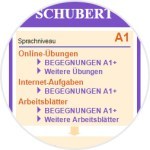 This publisher of German textbooks has made a number of German worksheets and online exercises available for free on their website. While these resources are designed to be used together with their official textbooks, German learners can still benefit from these worksheets and exercises for daily practice even without having access to the main text. Some online exercises even contain audio to help with listening comprehension and pronunciation. All resources are split into levels from A1 to C2.
This publisher of German textbooks has made a number of German worksheets and online exercises available for free on their website. While these resources are designed to be used together with their official textbooks, German learners can still benefit from these worksheets and exercises for daily practice even without having access to the main text. Some online exercises even contain audio to help with listening comprehension and pronunciation. All resources are split into levels from A1 to C2.
 Online-Exercises (A1 / A2 / B1 / B2 / C1 / C2)
Online-Exercises (A1 / A2 / B1 / B2 / C1 / C2)
 Worksheets (A1 / A2 / B1 / B2 / C1 / C2)
Worksheets (A1 / A2 / B1 / B2 / C1 / C2)

 Format: PDF/HTML
Format: PDF/HTML
 This is another huge resource for German worksheets and exercises created by Norbert Bensch. Not only does this site offer a complete detailed explanation of German grammar in the way of an online textbook which is great for self-directed learners, there are also verb lists to help make sense of conjugation patterns, exercises for reading comprehension, videos and much more.
This is another huge resource for German worksheets and exercises created by Norbert Bensch. Not only does this site offer a complete detailed explanation of German grammar in the way of an online textbook which is great for self-directed learners, there are also verb lists to help make sense of conjugation patterns, exercises for reading comprehension, videos and much more.
 Grammar Worksheets (Explanations / Exercises)
Grammar Worksheets (Explanations / Exercises)
 Reading Comprehension
Reading Comprehension
 Online Exercises
Online Exercises

 Format: PDF/HTML
Format: PDF/HTML
 Toms Deutschseite is a great resource for self-study, since it covers most of the basics, has detailed explanations (in English!) and exercises about all of the essentials. The exercises are linked at the end of each grammar topic together with an answer key. A good way to start browsing this site is by selecting a topic from the table of contents and reading/working through the worksheets.
Toms Deutschseite is a great resource for self-study, since it covers most of the basics, has detailed explanations (in English!) and exercises about all of the essentials. The exercises are linked at the end of each grammar topic together with an answer key. A good way to start browsing this site is by selecting a topic from the table of contents and reading/working through the worksheets.
 Grammar Worksheets
Grammar Worksheets
 Vocabulary Worksheets
Vocabulary Worksheets
 Reading Comprehension
Reading Comprehension
 Writing Assignments
Writing Assignments
 Spelling Worksheets
Spelling Worksheets

 Format: PDF/HTML
Format: PDF/HTML
–
photo via pixabay.com
The post Free German Worksheets & Exercises for Beginners and Intermediate Learners appeared first on LearnOutLive.
February 18, 2016
Berlin Quiz Time: Test Your Knowledge About The German Capital
With its 3.5 million citizens, Berlin is the largest city in Germany. It’s nine times bigger than Paris, has more bridges than Venice and is famous for its exuberant night-life and event culture. How well do you know the German “Haupstadt”? Take our quick Berlin quiz and share your results with your friends.
1. How tall is the Berliner Fernsehturm (TV-tower)?
by Nico Trinkhaus (CC)
298.53 meters / 979.42 feet
368.03 meters / 1207.44 feet
423.54 meters / 1389.56 feet
2. How are these types of doughnuts called in Berlin?

by tin.G (CC)
Hamburger
Pfannkuchen
Berliner
3. Who of the following famous people wasn’t born in Berlin?

Herbert Marcuse pic via Wikimedia https://commons.wikimedia.org/wiki/Fi..., Einstein and Dietrich Public Domain
Marlene Dietrich
Albert Einstein
Herbert Marcuse

by Jonathan (CC)
Bundestag
Reichstag
Bundesbank
5. Which of the following is not a Berlin district?

geographical map from the public domain, 1910
Friedrichshain-Kreuzberg
Wohldorf-Ohlstedt
Steglitz-Zehlendorf

by Alex Kehr (CC)
around 1600
around 1000
around 800

public domain image
Wilmersdorf
Charlottenburg
Schöneberg

by Christian Schnettelker (CC)
Schrippen
Buletten
Kippen

by Espen Sundve(CC)
Tempelhof-Schöneberg
Pankow
Friedrichshain-Kreuzberg
10. The coat of arms of Berlin depicts which animal?

an eagle
a dragon
a bear
The post Berlin Quiz Time: Test Your Knowledge About The German Capital appeared first on LearnOutLive.
Test Your Knowledge About The German Capital With Our Quick Berlin Quiz
With its 3.5 million citizens, Berlin is the largest city in Germany. It’s nine times bigger than Paris, has more bridges than Venice and is famous for its exuberant night-life and event culture. How well do you know the German “Haupstadt”? Take our quick Berlin quiz and share your results with your friends.
1. How tall is the Berliner Fernsehturm (TV-tower)?
by Nico Trinkhaus (CC)
298.53 meters / 979.42 feet
368.03 meters / 1207.44 feet
423.54 meters / 1389,56 feet
2. How are these types of doughnuts called in Berlin?

by tin.G (CC)
Hamburger
Pfannkuchen
Berliner
3. Who of the following famous people wasn’t born in Berlin?

Herbert Marcuse pic via Wikimedia https://commons.wikimedia.org/wiki/Fi..., Einstein and Dietrich Public Domain
Marlene Dietrich
Albert Einstein
Herbert Marcuse

by Jonathan (CC)
Bundestag
Reichstag
Bundesbank
5. Which of the following is not a Berlin district?

geographical map from the public domain, 1910
Friedrichshain-Kreuzberg
Wohldorf-Ohlstedt
Steglitz-Zehlendorf

by Alex Kehr (CC)
around 1600
around 1000
around 800

public domain image
Wilmersdorf
Charlottenburg
Schöneberg

by Christian Schnettelker (CC)
Schrippen
Buletten
Kippen

by Espen Sundve(CC)
Tempelhof-Schöneberg
Pankow
Friedrichshain-Kreuzberg
10. The coat of arms of Berlin depicts which animal?

an eagle
a dragon
a bear
The post Test Your Knowledge About The German Capital With Our Quick Berlin Quiz appeared first on LearnOutLive.
December 1, 2015
You’re The Alien! How Learning A New Language Gives You A Radically Different Perspective on Life (If You Let It…)

When I lived in Bangkok for four years, I often found myself stuck in the city’s notoriously bad traffic, staring out at the bustling sidewalks, and there was a certain recurring sign that never failed to catch my attention. It said: “Marriage for Alien“.
Despite knowing better, I always imagined an almond-eyed couple with big green heads, exchanging their vows in a language filled with strangle warbles and clicks before zipping through the sky in their retro-chic flying saucer, spelling out “just married” in the wake of their electromagnetic exhaust.
And now, almost twenty years later, living yet again in a strange foreign land which is not my own, this time in the Middle, not the Far East, I realize that these notions of extra-terrestrials are actually not a far cry from the true expat-experience.
Discovery and Dissonance
photo by Roger Price via Flickr (CC)
When you live in a place that speaks your language, where cultural customs and unspoken rules are the same you were brought up with, there’s generally not a lot of friction with the environment, except for the usual minor annoyances of finding a parking spot, delayed trains, etc.
But when you’re a stranger in a strange land even the tiniest part of everyday reality can be cause for discovery or dissonance. Learning a new language, trying to find your way around bewildering customs and unspoken rules — I’ve often compared this to the situation of a child: everything is new and presents an opportunity for learning. What this simile doesn’t take into account however, is that the adult expat or migrant (what’s an expat after all, but a “white, rich migrant?“) has a whole different system of language and culture already ingrained in him, which may often be at odds with those of the new environment, hence the image of the alien or extraterrestrial seems far more fitting.
Expectation vs. RealityIt’s part of our nature as human beings that we experience psychological discomfort whenever our expectations don’t line up with reality. For example, when the weather forecast predicts sunshine and we suddenly find ourselves in a downpour without an umbrella, it’s not just getting wet that makes us uncomfortable, but the fact that reality seems to deviate from our expectation!
Like I said before, usually these moments don’t occur that frequently in our lives, but when you’re learning a new language and culture, cognitive dissonance becomes the modus operandi. For example, a native English speaker doesn’t expect nouns to be gendered, but the German language genders everything threefold. Dissonance! In the West we expect to read our words from left to right, but in Hebrew or Arabic they’re flying at us from right to left. Dissonance!
Why don’t more people learn a foreign language or live abroad for extensive periods of time? Very simple, because it’s uncomfortable. To hark back to our initial image, it essentially turns you into an alien! You will act, sound and look strange — even if you try to assimilate, it’s hard to hide your true nature.
The comfort zone and the extent to which one is willing to step out of it varies with each individual. We are, after all, creatures of habit and comfort. However, I believe that learning to become more comfortable (!) with increasing levels of cultural and linguistic strangeness may just be the biggest benefit of learning a language!
Sure, it’s nice being able to watch a foreign movie without subtitles or order an espresso or a falafel like a native, but ultimately, language learning is so much more than just a functional improvement; it allows us to grapple with deep internal discomfort, in the process of which we may perhaps become just a little bit more forgiving of ourselves and others, because as weird as “they” may seem, we may be even weirder.
–
The post You’re The Alien! How Learning A New Language Gives You A Radically Different Perspective on Life (If You Let It…) appeared first on LearnOutLive.
October 22, 2015
10 Strange German Laws (Fact vs. Fiction)
Germany is well-known for being a country with a million different laws, rules and regulations about everything from signing forms to building houses. There are many blogs and news-outlets online that talk about any number of “crazy German laws”, some of which are either outdated or simply wrong. Today, I’ve looked into a few of those and tried to weed out truth from fiction. Ready? Here we go!

image by Dirk Vorderstraße via Flickr/CC
1. It’s illegal to run out of fuel on the AutobahnTRUE. As a motorist in Germany you have to observe a gamut of laws. One of your obligations as a driver is to make sure to always fill up the tank on time. Especially when driving on the Autobahn, Germany’s world-famous speed-limit free highway-system, this can become a problem because it’s forbidden to stop. Yes, that’s right, if you pull over you better have a good reason for it! Running out of fuel doesn’t count, in fact it’s considered personal negligence and can get you a nice fine or even a point in Flensburg, which hosts the nationwide database of traffic violators, sometimes also called Verkehrssünderkartei (“traffic sinner card file”).

image by digital cat via Flickr/CC
2. It’s forbidden to work in an office without windowFALSE! You don’t have a right to an office with window in Germany. Many blogs and English resources wrongly report that there’s a law which says that “it’s illegal to work in an office without windows” while the actual law only states that offices have to be at moderate temperatures and sufficiently aired, which may also be accomplished by airconditioning.

image by Austin Connell via Flickr/CC
3. It’s forbidden to tune the piano at midnightTRUE. Germans love their silence, even if it needs to be upheld by a battery of laws, rules and regulations. For example, the Federal High Court of Justice has ruled that making music or practicing your instrument in rental apartments is only allowed between 8:00-12:00 and 14:00-20:00. So, when inspiration strikes, make sure to consult the clock first! But even while considering these timeframes, the total length of playing time is limited, depending on the instrument, for example piano players get up to two hours per day, whereas drummers have to limit themselves to 45 minutes in summer and 90 minutes in winter.

image via pixabay
4. It’s forbidden to keep urns at homeTRUE. The German law of Friedhofszwang (“cemetary compulsion”) demands that any mortal remains have to be deposited in a designated space, i.e. either on a cemetery or as part of an official burial at sea. Originally conceived for hygienic reasons this law therefore forbids the safekeeping of urns at home, although in some parts of Germany this law is slowly being eased, for example in Bremen where since the 1st of January, 2015 it is now allowed to scatter about the ashes of loved ones on private property, provided that no winds are present which might carry the remains onto the balconies and flowerbeds of neighbors.

image by Judith Doyle via Flickr/CC
5. It’s illegal to hang the laundry on SundayFALSE! There’s a myth floating around on the Internet that there’s a German law which forbids the hanging of laundry on Sundays. There may be individual rental contracts or house rules which include this regulation, but there is in fact no national German law about this. Of course it could still happen, especially in particularly religious areas, that some people might object to this display of “mundane work” on the “Lord’s day”, but as long as your contract or the house rules don’t mention it, hang away!

image by Thomas M via Flickr/CC
6. It’s illegal to sing the first verse of the German national anthemThe Lied der Deutschen (song of the Germans) has been the national anthem since 1922. Under the rule of the Nazis, only the first verse was used which begins with “Germany, Germany above everything”. At the end of World War II this song was temporarily banned by the Allies for obvious reasons. In modern Germany, there is in fact no law against singing this verse, but whoever does belt it out in public will usually be disdained for the flirting with Third Reich ideologies.

image by Samuel M. Livingston via Flickr/CC
7. It’s forbidden to make noise at lunchtimeFALSE! Contrary to popular opinion there is no (unified) national law regulating the Mittagsruhe (quiet-time around lunch). While there have been some rules and regulations in the past in certain federal states, they have mostly been lifted. Careful though! Similar to the laundry issue above, this matter may still be part of a rental contract or house rules. Also, there are still several general rules around “Lärmschutz” (noise control) but these are mostly limited to Sundays between 13:00-15:00.

image by Gene Han via Flickr/CC
8. A pillow is considered a “passive weapon”UNCLEAR. According to many blogs and forums in Germany a pillow can be considered a “passive weapon”, i.e. a weapon used in defense against another individual and/or weapon. I’ve tried finding proof for this, but have come up empty so far. Curiously, there seems to be one case where a man in Cologne lost a tooth in a pillowfight and tried to sue but failed. If anyone knows more about the legal situation of pillowfighting in Germany, please post it in the comments below, preferably with a direct quote from the legal text.

image by Metropolico.org via Flickr/CC
9. Saying “Du” to a Policeman will cost youTRUE. As if it weren’t difficult enough for German learners to discern the social minutiae of when to say “Du” or “Sie”, addressing a policeman in 2nd person singular can be cause for a fine of up to 600 euros. Furthermore, there’s a whole list of swear-words and their corresponding fines, based on previous offenses. For example, a “Depp!”, “Blöde Kuh!” or “Idiot!” will cost in between 15-30 daily rates, i.e. the fine depends on your income, so the more you earn the more you pay. Thus sticking out your tongue can quickly cost you about 150 euros, whereas flipping the bird soon gets you up to 4000.

image by Glenn Halog via Flickr/CC
10. It’s forbidden to wear masks in publicFALSE! It’s not generally forbidden to wear masks in public, a good example being the Carnival. There is however a Vermummungsverbot which forbids participants of marches and rallies to cover up their face in order to obscure their identity, punishable with a fine or jail-time to up to one year. In reality it’s not always that easy to enforce this law however, since it’s often disputable what exactly constitutes a full face cover, and the criminal prosecution of this offense can often be very lengthy and costly.
–
thanks to linguisten for helping out with an issueThe post 10 Strange German Laws (Fact vs. Fiction) appeared first on LearnOutLive.
September 27, 2015
How To Use A German-English Dictionary with Kindle Cloud Reader
As a language instructor and author of language learning textbooks, I’ve always found the Kindle’s built-in dictionary a great way to make reading foreign language texts more fluid and frictionless. Whether it’s on your Kindle ereader, on your iPhone or iPad Kindle app, or Kindle Android app (see links for detailed instructions), custom dictionaries can be easily integrated, so that all you need to do is tap on unknown words to get an immediate translation.
What has been missing from this list so far is an option to get the same feature on desktop computers, i.e. when reading Kindle books on your PC or Mac.
Cloud Reader: Not Enough Dictionaries, No Copy & Paste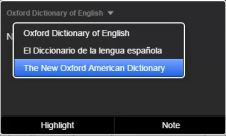 While trying to get Kindle PC to accept custom dictionaries ultimately proved futile, I started looking into another way to accomplish this with Kindle Cloud Reader. In case you’re not familiar with it, Cloud Reader is a web-app that allows you to read Kindle books directly from your browser. Also Cloud Reader offers a handful of pre-installed dictionaries, but unfortunately there is no discernible way to install more dictionaries. Even purchased dictionaries from the Kindle store don’t show up here.
While trying to get Kindle PC to accept custom dictionaries ultimately proved futile, I started looking into another way to accomplish this with Kindle Cloud Reader. In case you’re not familiar with it, Cloud Reader is a web-app that allows you to read Kindle books directly from your browser. Also Cloud Reader offers a handful of pre-installed dictionaries, but unfortunately there is no discernible way to install more dictionaries. Even purchased dictionaries from the Kindle store don’t show up here.
Furthermore, Kindle Cloud Reader doesn’t allow copying of text, which is probably to prevent piracy, but also it prevents readers to look up and translate words or use third-party browser extensions for further study, such as flashcards, etc.
The Kindle Cloud Reader BookmarkletSo is Kindle Cloud Reader also a dead-end street if you’re trying to “click & translate” words from your Kindle books? Turns out, binarycrafts from Romania have found a way to circumvent Kindle Cloud reader’s blocking of text copying by use of a simple bookmarklet.
I’ve adapted their code for language learning purpose (specifically German learning), so that after activating the bookmarklet you get two different options for sending selected text to either dict.cc or Google Translate.
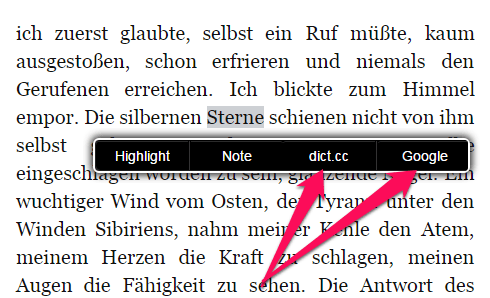
activating this bookmarklet will add two buttons
How does it work?Drag this bookmarklet to you bookmark bar (or copy this code and paste it into a new bookmark URL)Go to read.amazon.comClick on the bookmarklet. You’ll get a popup confirmation upon successful launch.Click on words to translate either via dict.cc or Google TranslateObviously this is just a hack until Amazon will (hopefully) add the use of custom dictionaries to their PC, Mac or Cloud reader application. But until then it’s certainly a way to get quick translations. Let me know in the comments what you think.
–
Special thanks to Peter Cole's Bookmarklet Creator.

 About the author:
André Klein was born in Germany, has grown up and lived in many different places including Thailand, Sweden and Israel. He has produced two music albums, performed and organized literary readings, curated an experimental television program and is the author of various short stories and non-fiction works.
About the author:
André Klein was born in Germany, has grown up and lived in many different places including Thailand, Sweden and Israel. He has produced two music albums, performed and organized literary readings, curated an experimental television program and is the author of various short stories and non-fiction works.
The post How To Use A German-English Dictionary with Kindle Cloud Reader appeared first on LearnOutLive.







